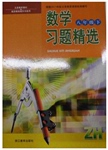题目内容
14.I think I'm just slightly overweight,but every time I ________ myself in the mirror,I feel so disappointed.( )| A. | have fun with | B. | play a trick on | C. | catch sight of | D. | tell a lie to |
分析 我以为我只是轻微超重,但每次看到镜子里的自己我都感到很失望.
解答 答案C.
have fun with"和…玩乐";play a trick on"捉弄";catch sight of"看见";tell a lie to"向…撒谎".根据句子表达的意思"我以为我只是轻微超重,但每次看到镜子里的自己我都感到很失望."可知答案选C.
点评 本题考查动词短语的辨析.英语中有的词组没有捷径,只有平时加强记忆,要注意区别,记忆的时候不能忽视,这是常见的命题方式.平时要加强记忆,做题时,别忘了要结合上下文句意判断.

练习册系列答案
 习题精选系列答案
习题精选系列答案
相关题目
4.Happy birthday,Alice!So you have _____ eighteen already.( )
| A. | become | B. | turned | C. | grown | D. | passed |
3.环境问题影响着人们的工作,学习,生活等.而我们的工作,生活,生产等又使环境污染越来越严重.为此,你校英语协会将举行保护环境的活动,其中一项为征文比赛. 请根据以下提示,以"How to protect our environment?"为题写一篇短文参加征文活动.
注意:要求:1.字数100字左右.短文须包括所有提示内容,再进行适当发挥.
2.书写规范,卷面整洁(卷面分1--3分).
How to protect our environment?
.
| 环境存在问题 | 1.水污染越来越严重;2.森林砍伐严重;3.工厂排放(give off)废气,大气污染严重;4.白色垃圾等. |
| 如何保护环境 | 1)提高人们的环保意识(awareness). 2)制定环保法律,违者严惩. 3)你的建议:… |
2.书写规范,卷面整洁(卷面分1--3分).
How to protect our environment?
.
4.The Little Angel
Sally jumped up the moment she saw the surgeon come out of the operating room.She asked,"How is my little boy?"The surgeon said,"I'm (41)C.We did all we could,but your boy didn't (42)A it."
Sally(43)Dinto the chair.The surgeon asked,"Would you like some time with your son before he was transported to the (44)D?"Sally nodded.While saying goodbye,she ran her fingers(45)A through his thick curly hair."Would you like a lock of his hair?"the surgeon asked.Sally nodded yes.The surgeon cut a few hairs,and handed them to Sally.The mother said,"It was Jimmy's idea to (46)A his body to the university for study.He said it might(47)B somebody else."I said no at first,(48)B Jimmy said,‘Mom,I won't be using it after I die.Maybe it will help some other little boy spend one more day with his Mom.'"
"My Jimmy had a heart of (49)A,always thinking of someone else,always wanting to help others if he could."she went on.
Sally walked out of the hospital.She put the bag with Jimmy's (50)C on the seat beside her in the car.The drive home was (51)C.It was even harder to enter the (52)A house.She carried Jimmy's belongings,and the lock of his hair to her son's room.She started placing the model cars and other personal things back in his room (53)Bwhere he had always kept them.She lay down across his bed and,hugging his pillow,(54)B herself to sleep.
It was around midnight when Sally(55)D.Lying beside her on the bed was a letter.The letter said,
"Dear Mom,
I know you're going to (56)D me,and me too.I will always love you,Mom,even more (57)A each passing day.Someday we will see each other again.Until then,if you want to (58)Ca little boy so you won't be so lonely,that's OK with me.He can have my room and old toys to play with.
Don't be sad thinking about me.I don't hurt any more.The cancer is all (59)B.I don't have to stand that (60)Cany more.The angels in Heaven are so tender.They say I'm a Special Angel!I love you,Mom."
Sally jumped up the moment she saw the surgeon come out of the operating room.She asked,"How is my little boy?"The surgeon said,"I'm (41)C.We did all we could,but your boy didn't (42)A it."
Sally(43)Dinto the chair.The surgeon asked,"Would you like some time with your son before he was transported to the (44)D?"Sally nodded.While saying goodbye,she ran her fingers(45)A through his thick curly hair."Would you like a lock of his hair?"the surgeon asked.Sally nodded yes.The surgeon cut a few hairs,and handed them to Sally.The mother said,"It was Jimmy's idea to (46)A his body to the university for study.He said it might(47)B somebody else."I said no at first,(48)B Jimmy said,‘Mom,I won't be using it after I die.Maybe it will help some other little boy spend one more day with his Mom.'"
"My Jimmy had a heart of (49)A,always thinking of someone else,always wanting to help others if he could."she went on.
Sally walked out of the hospital.She put the bag with Jimmy's (50)C on the seat beside her in the car.The drive home was (51)C.It was even harder to enter the (52)A house.She carried Jimmy's belongings,and the lock of his hair to her son's room.She started placing the model cars and other personal things back in his room (53)Bwhere he had always kept them.She lay down across his bed and,hugging his pillow,(54)B herself to sleep.
It was around midnight when Sally(55)D.Lying beside her on the bed was a letter.The letter said,
"Dear Mom,
I know you're going to (56)D me,and me too.I will always love you,Mom,even more (57)A each passing day.Someday we will see each other again.Until then,if you want to (58)Ca little boy so you won't be so lonely,that's OK with me.He can have my room and old toys to play with.
Don't be sad thinking about me.I don't hurt any more.The cancer is all (59)B.I don't have to stand that (60)Cany more.The angels in Heaven are so tender.They say I'm a Special Angel!I love you,Mom."
| 41.A.worried | B.happy | C.sorry | D.grateful |
| 42.A.make | B.pass | C.win | D.like |
| 43.A.knocked | B.looked | C.got | D.sank |
| 44.A.house | B.church | C.hospital | D.university |
| 45.A.lovingly | B.anxiously | C.patiently | D.angrily |
| 46.A.donate | B.move | C.show | D.lend |
| 47.A.affect | B.help | C.protect | D.impress |
| 48.A.for | B.but | C.so | D.and |
| 49.A.gold | B.stone | C.wisdom | D.bravery |
| 50.A.toys | B.clothes | C.belongings | D.letters |
| 51.A.long | B.smooth | C.difficult | D.dangerous |
| 52.A.empty | B.familiar | C.big | D.old |
| 53.A.roughly | B.exactly | C.especially | D.possibly |
| 54.A.put | B.cried | C.sent | D.buried |
| 55.A.wrote | B.spoke | C.slept | D.awoke |
| 56.A.understand | B.forgive | C.leave | D.miss |
| 57.A.with | B.around | C.on | D.in |
| 58.A.save | B.host | C.adopt | D.visit |
| 59.A.lost | B.gone | C.cured | D.spotted |
| 60.A.depression | B.sadness | C.pain | D.stress. |